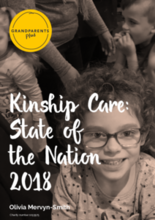The Kinship Care: State of the Nation 2018 survey is the largest survey ever of kinship carers in the UK. As in previous years, it shows that many carers aren't getting the support they need to enable children to thrive. The findings in this report are based on the largest survey of kinship carers ever - 1,139 kinship carers living in the UK. The survey was promoted widely, including to over 4,000 members of the Grandparents Plus Kinship Care Network, through Grandparents Plus’ Kinship Connected programme as well as via local authorities and social media channels. Surveys were completed using online and postal questionnaires between May – July 2018.
The results of the survey highlight the marked variations in support, both financial and practical, that is available to kinship carers who are looking after children under different legal arrangements. In addition, and new for this year, the survey explores some of the unique stresses associated with kinship care, and their impact on the health and wellbeing of kinship carers.
This year’s recommendations echo those of previous reports, but also highlight that the statutory guidance is not being implemented. There is therefore a need for fundamental, legislative change and investment to ensure that the right support is available to both children growing up in kinship care and their carers.
Key statistics include:
- Overall, only 14% of carers say they’re getting the support they need to bring up their child(ren), and only 11% say they are getting the emotional support they need.
- Equally, only 11% agree that they are getting the information they need from their local authority, although 27% of carers say they got the support they needed when the children first moved in.
- Over a third of kinship carers (36%) say they find it difficult to make ends meet. Just 26% say they’re getting the financial support they need.
- 66% of kinship carers surveyed said they are receiving regular financial allowances from their local authority, but many feel the amounts are less than is needed.
- 32% of carers in our survey said they were worried about their mental and physical health and their ability to carry out their kinship care role. Should these carers no longer be able to care for their children, this would mean an estimated 64,000 children would be likely to go into local authority foster or residential care. This would be at an associated cost to local authorities of £2.1billion per year.

